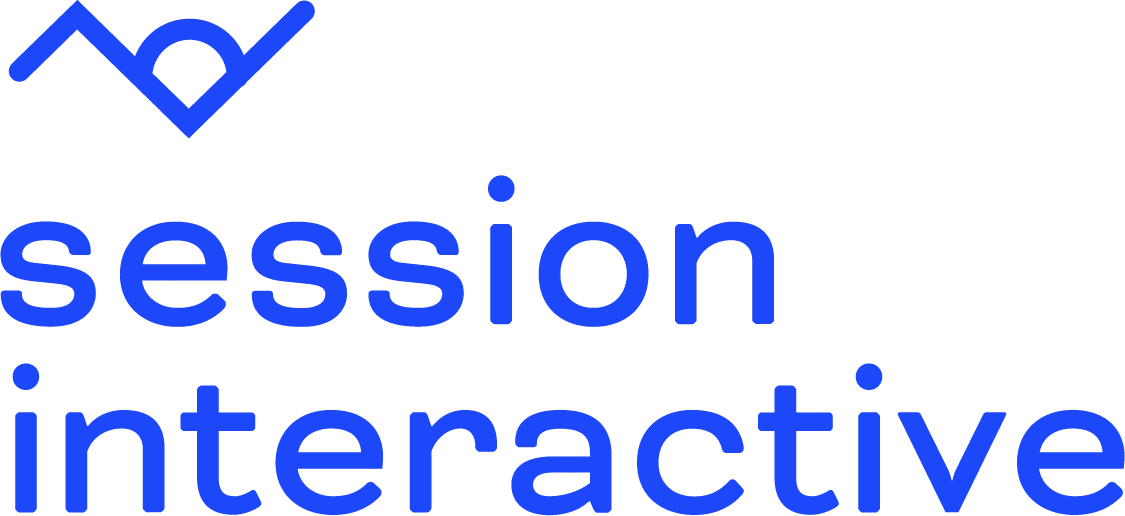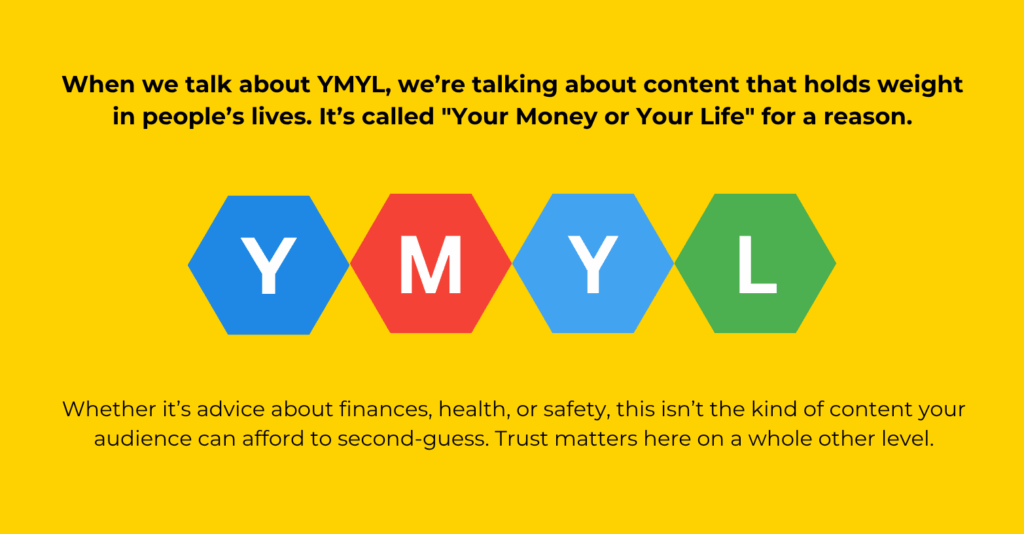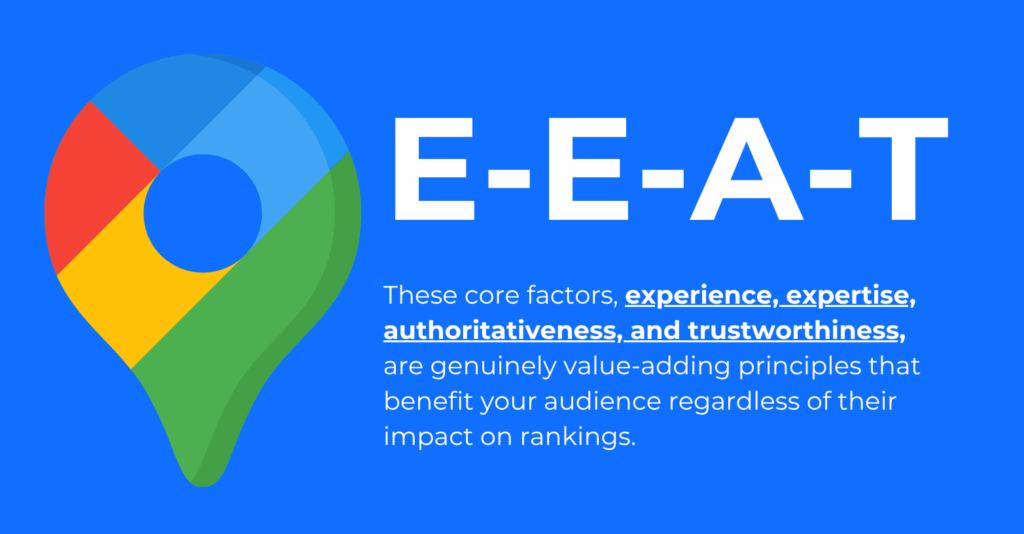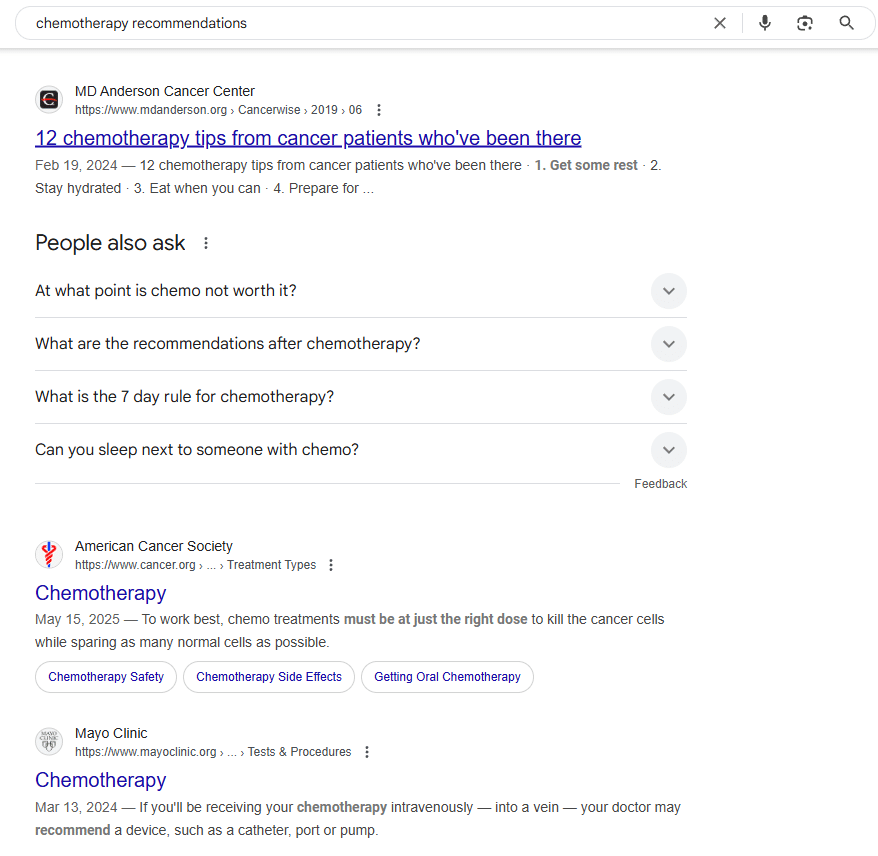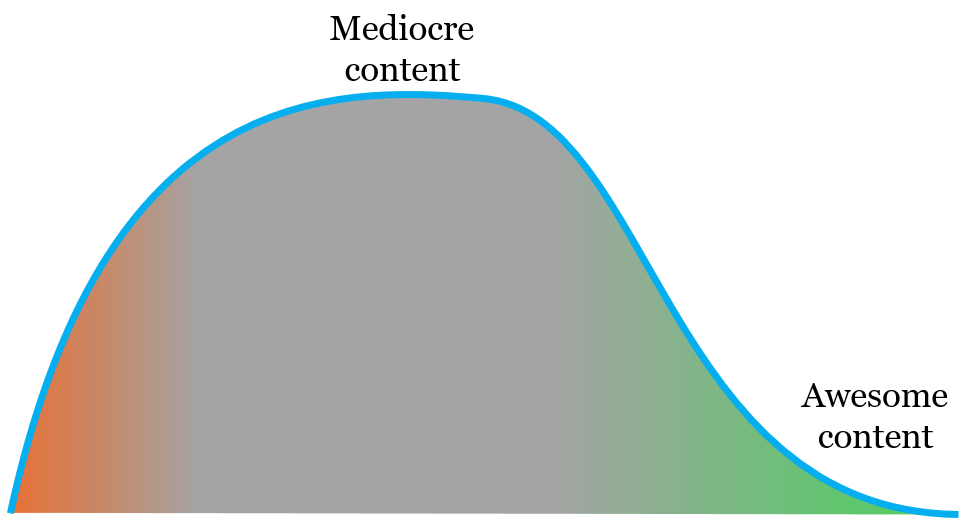Everyone says ‘create quality content,’ but almost no one defines what that means. That’s the challenge we face as marketers today, isn’t it? To me, quality isn’t just accuracy or an SEO checklist; it’s about authenticity and resonance.
Quality means creating something that meets user intent, goes beyond expectations, and genuinely adds value to the conversation. But here’s what sets brands apart: authenticity. How can you truly differentiate from the competition? What industry knowledge and expertise do you provide that’s unique to your area? What trust signals, endorsements, accolades, and community recognition have you built up over time?
This philosophy has shaped how we approach content at Session Interactive. When it comes to Google’s YMYL (Your Money or Your Life) categories and E-E-A-T (Experience, Expertise, Authoritativeness, and Trustworthiness) guidelines, there’s no room for shortcuts. These frameworks aren’t just abstract SEO concepts; they’re the foundation for building trust and delivering meaningful content that cuts through a crowded digital landscape.
YMYL and E-E-A-T emphasize building trust between you and your audience by evaluating the correctness and quality of your content. This is crucial when the digital landscape is inundated with unverified claims, pseudoscience, and outright falsehoods (not to mention all the AI junk content). Your content doesn’t just need to rank; it needs to earn its place as a dependable resource.
And here’s something important to remember: it’s okay to have content that doesn’t prioritize ranking. If you’re sharing a genuine perspective, building thought leadership, and establishing credibility around concepts meaningful to you and your audience, that’s valuable. Rankings are a great goal, but they shouldn’t limit your authenticity or creativity.
By the end of this guide, you’ll understand how YMYL and E-E-A-T work together to shape Google’s recommendations and, ultimately, SEO strategy. Especially when publishing about tricky topics like finances and health, these principles help your content get ranked, seen, and linked.
Decoding YMYL: What it Means for Your Brand
When we talk about YMYL, we’re talking about content that holds weight in people’s lives. It’s called “Your Money or Your Life” for a reason. Whether it’s advice about finances, health, or safety, this isn’t the kind of content your audience can afford to second-guess. Trust matters here on a whole other level.
For me, the question is always this: are we serving our audience better than anyone else? At Session Interactive, we believe that great SEO doesn’t chase rankings. It earns them by understanding what users really want and delivering that in a way that feels accessible, relevant, and trustworthy. That’s how you move from being just another option in search results to becoming the answer people turn to.
Here’s the truth I’ve learned over the years: Anyone can compete for clicks, but the real winners in this space are brands that dedicate themselves to producing content that earns trust through value and authenticity. That’s where YMYL content, done right, stands apart.
Health and Safety
Health and safety-related YMYL pages carry great responsibility. For example, a page on disease prevention isn’t just informative; it could change lives. That’s why Google expects this type of content to be authored or reviewed by certified professionals, such as doctors or safety experts. Now, consider the contrast between an article from a licensed medical professional and health advice shared in a social media post from a random non-professional. The latter often lacks verification and can easily spread misinformation, posing genuine risks to individuals seeking reliable guidance.
Financial Information
Money matters are another critical category. A simple misstep in financial advice could lead to wasted savings or worse. Credible, well-cited, and straightforward information is key here, often with credentials from financial planners or CPAs to back it up.
eCommerce Transaction
When it comes to eCommerce, transparency is everything. Clear product descriptions, honest customer reviews, and secure payment methods help establish trust, which is essential both for Google rankings and user confidence. Consider that compared to an online store with vague descriptions or fake reviews. These low-quality practices erode trust quickly, leaving consumers skeptical about a business’s authenticity.
Groups of People
Content addressing issues related to race, gender, or other societal groups falls under YMYL as well. Such pages should be created with care and backed by expert research to ensure they are both accurate and respectful.
Government, Law, and Civics
Legal and civic content topics like steps for immigration or an overview of tax regulations require expertise. Accuracy ensures people can make informed decisions about their rights and responsibilities. Yet social media platforms often circulate unverified “legal advice” that can mislead users, potentially keeping them from accessing the proper support or solutions they need.
The risks of consuming opinion-focused or unverifiable content are clear. When lives, finances, or societal norms are at stake, the difference between credibility and conjecture can be survival.
Unpacking E-E-A-T: Building Blocks of Trustworthy Content
At Session Interactive, we don’t view E-E-A-T as a checklist, we view it as a reputation system. It’s about how your brand shows up online, the consistency of the value you deliver, and the trust you cultivate over time. The brands that win aren’t just checking boxes; they’re building trust at scale, and that takes dedication.
E-E-A-T, which stands for Experience, Expertise, Authoritativeness, and Trustworthiness, has become a compass for quality content. It’s Google’s way of ensuring the web isn’t just full of noise but filled with real, valuable information that people can rely on. While E-E-A-T is essential for YMYL content, it plays a less critical role for non-YMYL websites, such as recipe blogs or hobbyist content. For these sites, E-E-A-T serves more as a guideline for building user trust and engagement rather than a strict SEO requirement.
But honestly, even if Google weren’t in the picture, these fundamentals would still matter. Why? Because trust is non-negotiable. If your audience doesn’t trust you, they won’t come back.
Here’s what I know after working with some of the world’s top brands: You don’t build trust overnight, and it doesn’t happen by chasing quick wins. True E-E-A-T runs deeper. It’s about using every piece of content to reinforce your reputation as a go-to resource. When we work with clients, we focus on helping them deliver not just information but reliability, so their audience knows, time and again, they can count on them for real value. That’s the essence of E-E-A-T, and that’s how we approach it at Session Interactive.
Experience
Firsthand experience adds depth and authenticity to content. A blog post about hiking trails, for instance, is far more authoritative coming from someone who’s explored those paths rather than someone copying information from another site.
Expertise
This pillar focuses on formal knowledge. Certifications, degrees, and professional accomplishments support this. Medical and financial content especially benefit from authors who can demonstrate expertise through qualifications.
Authoritativeness
Being recognized by others in your field builds authority. High-quality backlinks, citations from industry leaders, and a strong personal or brand reputation all strengthen this element.
Trustworthiness
Trust is essential in every industry, but particularly in YMYL pages. Your audience should feel confident that the information on your site is reliable and accurate, supported by clear citations and secure website features like HTTPS.
The Intersection of YMYL and EEAT
It’s important to note that EEAT is not required “in an algorithmic context for non-YMYL sites, such as recipe blogs or other kinds of non-critical content.” Information from John Mueller at Google indicates that “while [EEAT is] useful in a general or marketing sense to reflect expertise and trust, it’s not a ranking focus for most topics.”
We can see it in action. For example, here are the top hits for “chemotherapy recommendations”
We can see that the top result has both experience and expertise (published by a cancer center using recommendations from cancer patients). The other top hits are also all from highly credible organizations.
By focusing on strengthening E-E-A-T for YMYL content, you not only meet Google’s standards but also establish long-lasting trust with your audience.
The Role of Google’s Helpful Content Updates
When Google launched its Helpful Content Updates, it sent a clear message: content made just to game the rankings won’t cut it anymore. And honestly, I’m glad. At Session Interactive, we’ve always believed that great SEO doesn’t come from shortcuts or trickery. It comes from creating content that truly serves users. These updates align perfectly with what we’ve been teaching for years.
By 2024, these updates had contributed to a 45% reduction in unhelpful or misleading content within search results, driving home the importance of delivering value to actual users.
One of the biggest misconceptions I’ve seen is this idea that it’s all about choosing between quality or quantity. For larger, established brands with extensive resources, the reality is that it’s both: high-performing SEO demands operational excellence to ensure consistency while also holding to a standard of editorial authority that audiences can trust.
However, for smaller brands and emerging companies, the focus should be on authentic, thought-provoking content that provides unique perspectives. You don’t need to produce content at massive scale to build credibility. What matters is that your content is aligned with your genuine expertise, backed by real experience, and offers insights that your competitors can’t replicate. It’s not about clickbait or wild perspectives just to get attention; it has to be grounded in authentic expert knowledge.
One of the clear takeaways from these updates is that Google is focused on identifying and avoiding low-value content traits.
- Clickbait headlines that fail to deliver on their promises, articles generated purely through automation without proper oversight, and posts devoid of unique insights are prime examples of content that can be penalized.
- Recycling generic information that offers no new value to users won’t cut it. Marketing leaders must aim higher by focusing on creating content that educates, informs, and genuinely benefits their audience instead of solely chasing rankings.
However, not all strategies aim to build trust the right way. Practices like “black hat” and “gray hat” SEO deliberately try to game the system, exploiting loopholes to manipulate rankings. These methods might deliver short-term wins, but they come with significant risks, including damaging penalties from search engines and a loss of audience trust. Consider this: what’s the value of winning a click from a search engine if the content you serve is low-quality? That click you just won is now a negative brand impression, not a positive one.
Contrast that with the power of genuine, high-quality content that delivers real value to users. Not only does it meet Google’s standards, but it also fosters long-term credibility, ensuring your brand stands above the noise.
What’s exciting about these updates is the opportunity they present for those of us who care about doing it right. They level the playing field, prioritizing content that genuinely helps over fluff that’s designed only for clicks. That’s a win for everyone, not just search engines, but also the people on the other side of the screen looking for answers.
Operationalizing E-E-A-T: Content and Technical Best Practices
When it comes to implementing E-E-A-T, I always tell my team and clients the same thing: the goal isn’t just about meeting Google’s expectations. It’s about meeting your audience’s expectations and being authentically yourself. Great SEO doesn’t chase rankings; it earns them by helping you extract and showcase your authentic expertise.
The most effective approach starts with defining your ideal customer profile, establishing clear research goals, and conducting comprehensive competitive analysis across all platforms: search engines, LLMs, social media, and industry-specific channels. This foundation helps you identify core themes and create content briefs that align with where your audience actually engages.
Integrating E-E-A-T principles into your content and technical strategy is crucial for building trust and meeting Google’s evolving standards. But remember: we want to distribute authentic aspects of our content across multiple channels, not just distribute for distribution’s sake. Whether it’s a SlideShare presentation, Reddit discussion, podcast appearance, or newsletter, each piece should maintain the integrity and expertise that makes your perspective unique.
AI has made publishing bad-to-mediocre content easier and faster, making it harder to stand out with content that doesn’t contain authenticity and expertise. Incorporating EEAT deep into your process helps you get over to awesome content and properly stand out in search.
What I’ve learned through experience is that E-E-A-T isn’t a set-and-forget strategy. It’s an ongoing effort that requires consistency, transparency, and care. If you focus on delivering real value and telling a compelling story based on credibility, everything else will fall into place.
Content Strategy
Start with the fundamentals. Demonstrate subject matter expertise by using credible sources and showcasing authors’ credentials. Ideally, the expert should lead the writing process, combining their firsthand experience with their medical expertise to produce content that’s both accurate and authentic. When this isn’t possible, a strong alternative is to integrate their direct input.
For example, if you’re publishing a study on heart health, include citations from medical journals and an author bio detailing the writer’s healthcare background. A writer could collaborate with a cardiologist through interviews or consultations to ensure every statement is medically sound. Use quotes and insights from these professionals to add authority and depth while fact-checking the final draft to confirm accuracy. Including their credentials prominently, such as within an author bio or alongside their contributions, builds trust with readers and signals credibility to both your audience and search engines.
Simply put, whether authored by or heavily informed by medical professionals, this approach anchors your content in expertise, making it more dependable, engaging, and impactful.
On-Page Optimizations
It’s important to create polished UI/UX design that prioritizes clarity and simplicity. Logical navigation, clean layouts, and minimal distractions ensure users can find what they need quickly while staying engaged. When a site is easy to explore and visually intuitive, it not only enhances user satisfaction but also sends positive signals to search engines about content quality.
Technical SEO Foundations
Effective technical optimization starts with structured data. By implementing rich markup, you help search engines understand your content’s context, such as identifying key topics, author credentials, and publication dates. This is especially valuable for building trust and authority in E-E-A-T-sensitive industries like healthcare or finance.
Core technical factors also influence how your site is perceived. Ensure your pages load quickly, are secured with HTTPS, and function seamlessly on mobile devices. Regularly monitor for broken links and outdated content to keep your site in peak performance.
Measuring Success
Metrics matter. Monitor KPIs such as time on page, bounce rate, and content shares to gauge how well your strategies are working. Trends in organic traffic and keyword rankings can also offer insights into whether your content aligns with Google’s E-E-A-T expectations.
Building Authority When You Have Expertise But Lack Recognition
Many organizations possess deep expertise and valuable experience, but haven’t yet built the external authority signals that search engines and audiences recognize. If this sounds familiar, don’t let it discourage you from creating valuable content.
Building authority requires strategic community engagement and content diversification. Consider community outreach initiatives, contributing to industry publications, and expanding your distribution across multiple platforms. Leverage your internal influencers, those product marketing leaders, executives, and board members who have invested in your industry and can explain why they believe in certain approaches or endorse specific strategies.
The key is getting your authentic message out there as much as possible while maintaining credibility. Authority isn’t built overnight, but consistent, genuine expertise shared across the right channels will gradually establish the trust signals that both search engines and your audience are looking for.
A Realistic Perspective on Google’s Guidelines
While we advocate following Google’s E-E-A-T and helpful content guidelines, it’s important to take this advice with a grain of salt. We’ve seen these principles work exceptionally well for many clients, but we’ve also seen instances where results were more nebulous or didn’t perform as expected.
Google’s guidance provides valuable direction, but the real world of SEO is more complex than any single framework can capture. These core factors, experience, expertise, authoritativeness, and trustworthiness, are genuinely value-adding principles that benefit your audience regardless of their impact on rankings.
Focus on being your authentic self and helping your clients extract their authentic expertise to target their ideal customers effectively. The goal is telling a convincing, compelling story that’s based in credibility, whether or not it perfectly aligns with every aspect of Google’s recommendations.
E-E-A-T and Gaming Tactics
Achieving expertise, experience, authoritativeness, and trustworthiness (E-E-A-T) is essential for creating high-quality content. But trying to “game” these elements with deceptive tactics is not the way to go. Google’s updated Search Quality Raters Guidelines shed light on practices that aim to falsify E-E-A-T and the consequences that follow.
Deceptive Purpose
Deceptive purpose refers to content that misleads users with inaccurate information designed to generate profit, such as clicks on monetized links. For instance, a site claiming to have independently tested a product when no such testing took place. These tactics might seem like shortcuts to gain user trust, but they undermine credibility and leave audiences feeling betrayed.
Fake Business Details
One “black hat” tactic is fabricating business information to appear more credible. For example, a website might claim to operate a physical “brick and mortar” store when it actually doesn’t exist. Using stock images or falsified addresses erodes credibility when discovered. Online businesses thrive on transparency, and your audience will value honesty over strategic misrepresentation.
Fabricated Author Profiles
Adding non-existent or AI-generated personas as content creators is another red flag. For instance, an author profile with a fake photo and a fabricated bio claiming unearned expertise might seem like a shortcut to building credibility. However, these tactics undermine trust in your brand and can alienate your audience. Google’s algorithms and quality raters are increasingly sophisticated at detecting this kind of fraud, meaning this approach is both risky and counterproductive.
False Claims of Expertise
Claiming unverified or false expertise is a major misstep. A blog written by someone who claims to be a certified professional but isn’t is a clear violation of trust. For example, if a “nutritionist” pushes diet advice without the appropriate credentials, the audience is likely to feel deceived when the truth comes to light. Real credentials and earned expertise are the backbone of genuine E-E-A-T.
The Importance of Authenticity
What these examples highlight is that trying to game E-E-A-T is a risky and short-term strategy. These guidelines are not a checklist you can game but quality that builds over time through honesty, transparency, and genuine value. Audiences increasingly demand verification, and Google’s algorithms are aligning with these expectations.
Don’t chase quick wins with shortcuts or falsifications. Instead, focus on being authentic, using verified credentials, and delivering real value to your audience. True E-E-A-T is about integrity and quality, not illusion.
Conclusion
At the end of the day, focusing on YMYL and E-E-A-T isn’t just about ticking boxes or staying on Google’s good side. It’s about building a reputation rooted in trust, expertise, and authenticity. The brands that succeed long-term are those that embrace these principles while staying true to their unique perspective and expertise.
If there’s one thing I want you to take away, it’s this: your audience will remember how your content made them feel and whether it helped them. Keep that front and center in everything you create. Build trust with every interaction, showcase your authentic expertise, and the rankings will follow.
The key is being genuinely helpful, consistently valuable, and unapologetically authentic in your approach. When you combine real expertise with honest communication and valuable insights, you create content that doesn’t just rank, it resonates.
For more insights on building authentic content strategies that align with E-E-A-T principles, explore our website where we share insights and case studies from our work with industry-leading brands.

